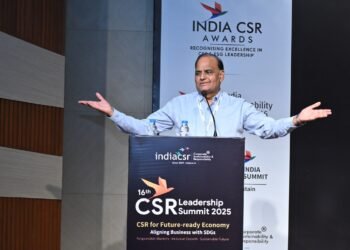The Company’s CSR activities are largely focused in the areas of education, skill development and sustainable livelihoods, healthcare and financial inclusion.
ICICI Prudential Life Insurance truly believes that through Corporate Social Responsibility (CSR) a difference can be made in various areas. Through partnership company have established to create a positive impact in areas like healthcare, skill development etc. The company considers CSR as a boon for the corporates do their duties towards the society and follows the agenda of making society sustainable.
In the below interview, Urvi Chhaya, Senior Vice President – Human Resources, ICICI Prudential Life Insurance Company Limited takes us through the philosophy for CSR initiatives taken by ICICI Prudential Life Insurance. She talks about the CSR being an integral part of the company’s activities with the support for meaningful socio-economic development in the country to enable a larger section of the country’s population to participate in and benefit from India’s economic progress. Chhaya also stats about the skill development initiatives with WWF that, “with the objective of protecting lives and livelihoods we collaborated with the World Wide Fund (WWF) for Nature–India for three programs”
What is the philosophy of ICICI Prudential Life Insurance on the basis of which CSR initiatives are decided?
Corporate Social Responsibility (CSR) has been a long-standing commitment at ICICI Prudential Life Insurance, and an integral part of our activities. We pro-actively support meaningful socio-economic development in the country to enable a larger section of the country’s population to participate in and benefit from India’s economic progress. This is based on our belief that growth and development are effective only when they result in access to opportunities and benefit the society at large.
The Company’s CSR activities are largely focused in the areas of education, skill development and sustainable livelihoods, healthcare and financial inclusion. The Company supports programmes and initiatives keeping ‘protection’ as the core proposition and cornerstone of all its CSR initiatives since ‘protection’ is core to the Company’s business. Serving the protection and long-term saving needs of the customers with sensitivity is at the core of the Company’s business.
How has been your association with Tata Memorial Hospital and what were the initiatives taken under this partnership?
One of the focus areas of our CSR initiatives is to provide healthcare support to the underprivileged sections of society. The Company initiated a partnership with Tata Memorial Hospital in the year 2016. Through this partnership, we extended support to underprivileged children and young adults for the treatment of cancer. Over 300 such patients have benefitted from this initiative.
What was your partnership with World Wide Fund (WWF) for Nature focusing on? What programmes were carried out under skill development initiatives with WWF?
Protection is central to all our CSR initiatives. With the objective of protecting lives and livelihoods we collaborated with the World Wide Fund (WWF) for Nature–India for three programmes:
The first was providing financial protection to forest guards, in case of eventualities such as death, permanent disability and critical illness while discharging their duties. Under the programme, which was implemented from November 2016 to December 2019, over 65 forest guards and their families were supported.
Securing sustainable livelihoods for local communities in the Himalayan rangelands of PirPanjal and Ladakh was the second initiative which was implemented from August 2017 to March 2022. Through this initiative we aimed to create diversified livelihood opportunities for communities living in the rangelands and also to promote sustainable rangeland management practices. Tribal women were trained in handicrafts. Also, several eco-cafes were set up to host tourists. A handicraft production facility was set up at Tsokar in Ladhak. Over 506 women were trained in the art of handicraft making, 40 homestays were set up and 6 eco-cafes were commissioned to host tourists. To ensure sustainable rangeland management practices, we implemented awareness and sensitisation programmes in educational institutions.
The third programme was aimed at extending financial support to villagers who lost their livestock to predators. The objective was to mitigate the risk of retaliatory action against predators by villagers. This three-year programme from January 2019 to March 2022, was implemented across WWF–India’s priority tiger landscapes in India, namely, Brahmaputra (Assam), Western Ghats (Tamil Nadu, Kerala, and Karnataka) and Terai Arc (Uttarakhand, Uttar Pradesh and Bihar). Over 3,800 villagers were supported during this three-year programme.
What programmes were supported with the partnership with Catalyst for Social Action (CSA)? In which regions was the programme implemented and how many children benefitted from this?
Skill development and ensuring positive health outcomes for underprivileged children is aligned to our CSR philosophy of protecting lives and livelihoods. The partnership with Catalyst for Social Action (CSA) enabled us to support over 900 children living in child-care homes in Madhya Pradesh. These children benefited from the holistic development covering basic hygiene, nutrition and education. Awareness workshops on personal safety, training on life skill competencies of communication, critical thinking, and collaboration were also conducted.
Another aspect of this initiative was the ‘Exit Preparation’ and ‘After Care’. This entailed counselling children from the age of 14 years helping them chalk out their career plans as per their choice and educational qualifications along with ‘Exit Preparation’ once they turn 18. The programme prepared them to meet expectations of society, made them independent and self-sustainable by providing vocational skills and ‘After Care’ support. Several children benefitted from this programme and are now pursuing higher education and vocational training. Also, several children have settled in jobs of their choice.
The programme also facilitated support to child-care homes for their infrastructure. This was done for the betterment of children, improving sanitation and living conditions in the homes. Capacity building of stakeholders of the homes was also an important aspect wherein the trustees and staff were trained on record maintenance, documentation and administrative work. Support has also been extended to these homes on the registration process so as to become eligible to receive government funding.
Currently, the Company has partnered with the CSA for a three-year programme to support underprivileged children living in 8 child-care homes in Maharashtra (Pune, Sangli and Ahmednagar) for improving their health outcomes.
Are there any new partnerships which ICICI Prudential Life Insurance is planning on?
Every year, the annual plans are curated keeping in mind the ongoing programmes and focus areas. The Company does receive proposals from various organisations which are evaluated based on the criteria as per the Companies Act and which are in alignment with the Company’s CSR focus areas.
What is the long-term vision of ICICI Prudential Life Insurance regarding CSR?
As a life insurance company, our core proposition is to meet the protection and long-term saving needs of our customers with sensitivity. A strong life insurance sector plays a pivotal role in the nation’s economic development by facilitating mobilisation of savings and offering financial protection to families by mitigating the risks on account of mortality and morbidity. We therefore, endeavour to identify key areas of social development that require investments and intervention, to create access and help protect underserved communities and realise India’s potential for growth and prosperity.
CSR trends are changing with time. What do you think the future of CSR will be going forward?
In the last few years, the entire regime of CSR has undergone a huge change bringing in more transparency and accountability. For instance, all implementing agencies through which companies undertake CSR initiatives have to register themselves with the Ministry of Corporate Affairs (MCA). The Impact assessment mandated by MCA is another step in encouraging companies to take considered decisions in deployment of CSR spends and assessment of its social impact.
What is your CSR budget?
It is in line with the mandated regulations.
Disclaimer: The views are that of the individual and do not necessarily reflect the views of the organisation.






















